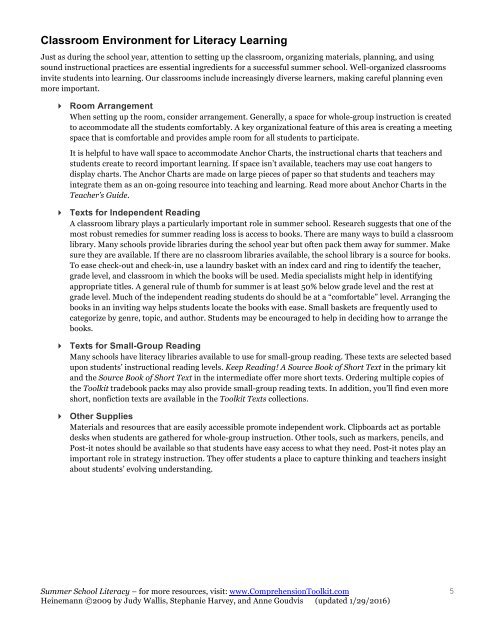Summer School Literacy Pacing Guide
SummerSchoolLiteracy
SummerSchoolLiteracy
You also want an ePaper? Increase the reach of your titles
YUMPU automatically turns print PDFs into web optimized ePapers that Google loves.
Classroom Environment for <strong>Literacy</strong> Learning<br />
Just as during the school year, attention to setting up the classroom, organizing materials, planning, and using<br />
sound instructional practices are essential ingredients for a successful summer school. Well-organized classrooms<br />
invite students into learning. Our classrooms include increasingly diverse learners, making careful planning even<br />
more important.<br />
! Room Arrangement<br />
When setting up the room, consider arrangement. Generally, a space for whole-group instruction is created<br />
to accommodate all the students comfortably. A key organizational feature of this area is creating a meeting<br />
space that is comfortable and provides ample room for all students to participate.<br />
It is helpful to have wall space to accommodate Anchor Charts, the instructional charts that teachers and<br />
students create to record important learning. If space isn’t available, teachers may use coat hangers to<br />
display charts. The Anchor Charts are made on large pieces of paper so that students and teachers may<br />
integrate them as an on-going resource into teaching and learning. Read more about Anchor Charts in the<br />
Teacher’s <strong>Guide</strong>.<br />
! Texts for Independent Reading<br />
A classroom library plays a particularly important role in summer school. Research suggests that one of the<br />
most robust remedies for summer reading loss is access to books. There are many ways to build a classroom<br />
library. Many schools provide libraries during the school year but often pack them away for summer. Make<br />
sure they are available. If there are no classroom libraries available, the school library is a source for books.<br />
To ease check-out and check-in, use a laundry basket with an index card and ring to identify the teacher,<br />
grade level, and classroom in which the books will be used. Media specialists might help in identifying<br />
appropriate titles. A general rule of thumb for summer is at least 50% below grade level and the rest at<br />
grade level. Much of the independent reading students do should be at a “comfortable” level. Arranging the<br />
books in an inviting way helps students locate the books with ease. Small baskets are frequently used to<br />
categorize by genre, topic, and author. Students may be encouraged to help in deciding how to arrange the<br />
books.<br />
! Texts for Small-Group Reading<br />
Many schools have literacy libraries available to use for small-group reading. These texts are selected based<br />
upon students’ instructional reading levels. Keep Reading! A Source Book of Short Text in the primary kit<br />
and the Source Book of Short Text in the intermediate offer more short texts. Ordering multiple copies of<br />
the Toolkit tradebook packs may also provide small-group reading texts. In addition, you’ll find even more<br />
short, nonfiction texts are available in the Toolkit Texts collections.<br />
! Other Supplies<br />
Materials and resources that are easily accessible promote independent work. Clipboards act as portable<br />
desks when students are gathered for whole-group instruction. Other tools, such as markers, pencils, and<br />
Post-it notes should be available so that students have easy access to what they need. Post-it notes play an<br />
important role in strategy instruction. They offer students a place to capture thinking and teachers insight<br />
about students’ evolving understanding.<br />
<strong>Summer</strong> <strong>School</strong> <strong>Literacy</strong> – for more resources, visit: www.ComprehensionToolkit.com<br />
Heinemann ©2009 by Judy Wallis, Stephanie Harvey, and Anne Goudvis (updated 1/29/2016)<br />
5


